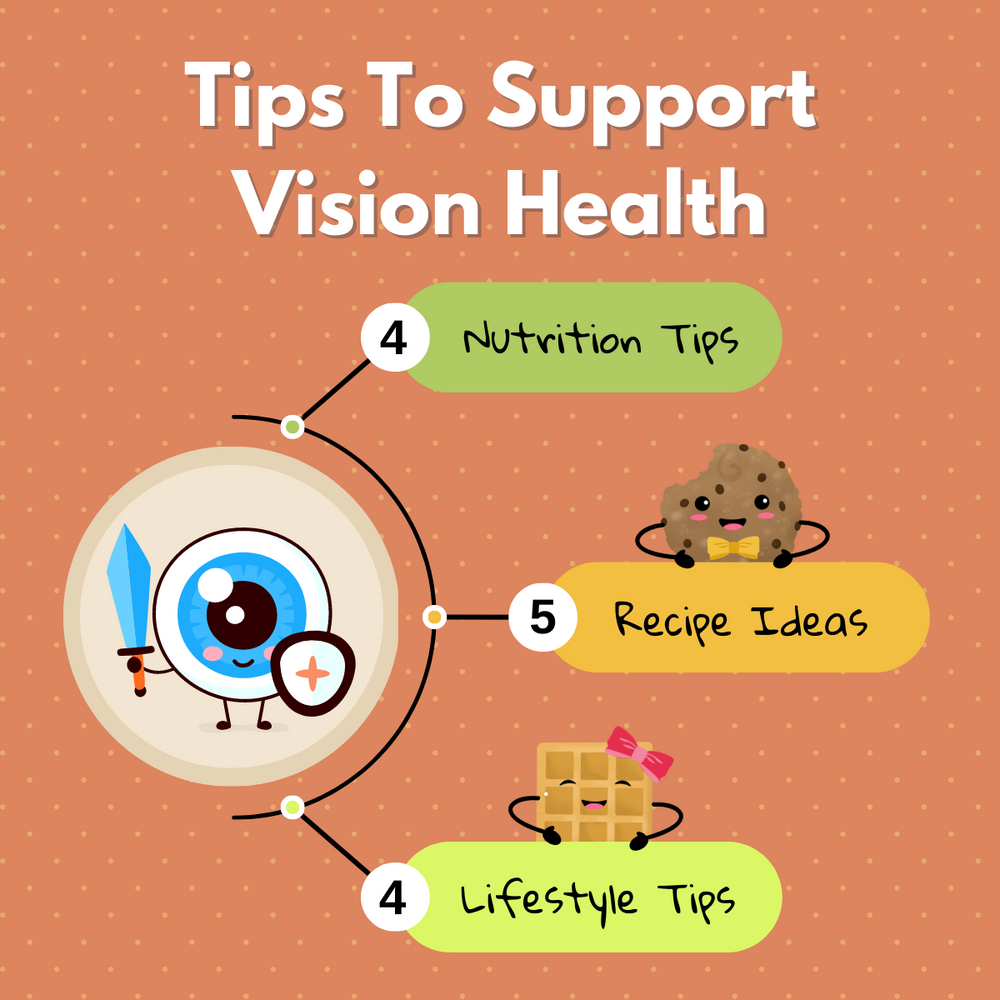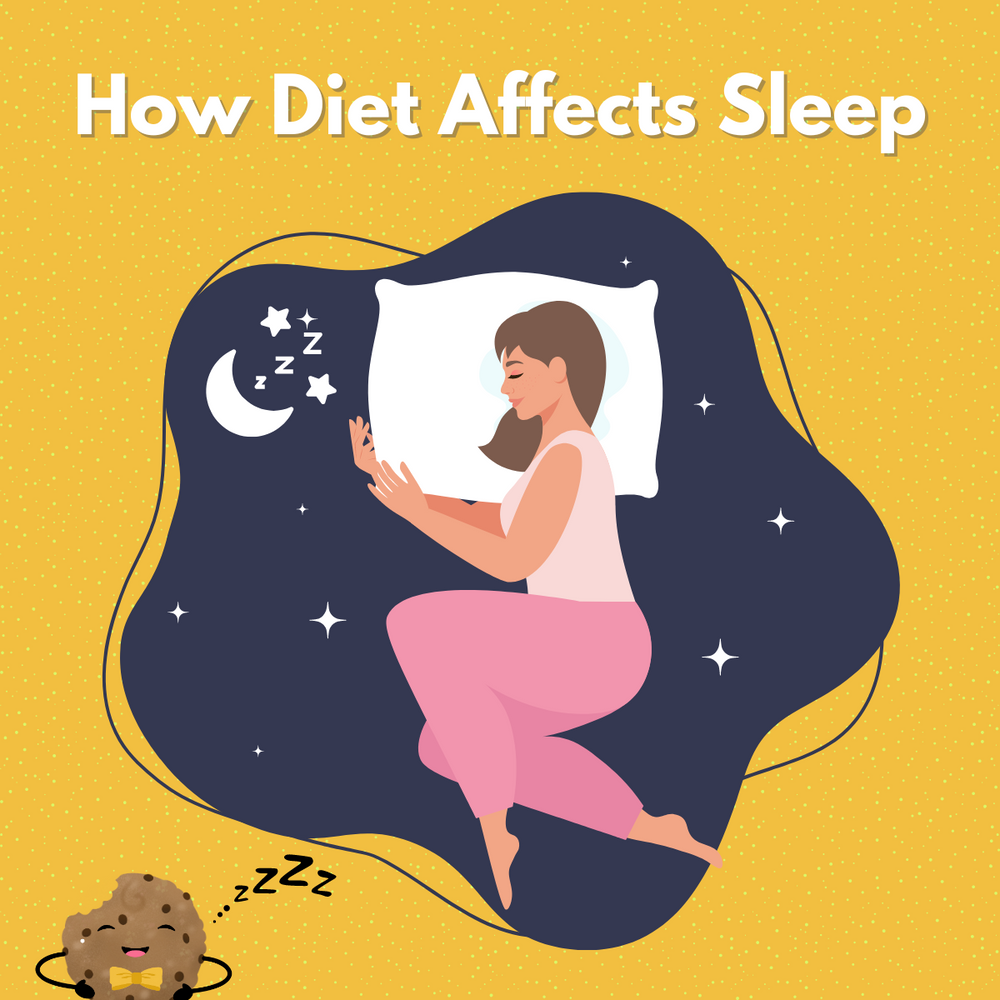Tips to Support Strong Vision Health Through Better Nutrition

Lifestyle And Nutrition Tips to Support Strong Vision Health
May is Vision Health month in Canada! It makes sense that we should “refocus” on our eye health as the summer months approach. Ultraviolet rays from the sun grow stronger as the days grow warmer. It’s important to protect not only your skin, but your eyes from the sun rays as well! In honour of vision health month, I have put together some simple tips on how to protect your eyes and support strong vision health as we move into the summer months. As a registered dietitian, I have listed some nutrient-packed creative meal ideas and recipes you can try!
Nutrition for Strong Eye Health
A. Hydration
Staying hydrated is key to eye health. Why? First of all, eyes are made up of mostly water to begin with! Drinking enough water (and eating high water content foods like fruits and vegetables) is also super important in maintaining the tears that lubricate the eye. This protects the eyes against dirt and debris, infection, and prevents dry eye syndrome. Dehydration leads to dry, irritated eyes and blurry vision. Take a skim through How to Stay Hydrated by Dietitians of Canada for more ideas on how to meet your daily fluid needs.
B. Vitamins
Vitamin A - Vitamin A plays a key role in maintaining healthy vision. Adequate vitamin A helps reduce your risk for developing night blindness or age-related macular degeneration. Dark green and orange plant foods are rich sources of this nutrient including (but not limited to) spinach, sweet potato, carrots and dried apricots. Animal liver is an excellent source of vitamin A, in fact pregnant women should limit their intake of liver as too much vitamin A can be harmful to a developing baby. Other animal sources include milk, eggs, and salmon. Slice up some sweet potato and/or carrot “fries” to roast in the oven for a delicious side dish at dinner!
Vitamin E - Vitamin E acts as an antioxidant to protect cells against damage. When it comes to vision health, vitamin E helps protect eye retina cells which are essential for seeing properly. Avocado, wheat germ, sunflower seeds, and almonds are all good sources of vitamin E. Sprinkle slivered almonds or roasted sunflower seeds over your cereal or oatmeal in the morning for an extra punch of vitamin E!
Vitamin C - Vitamin C is essential for the formation of healthy skin and tissues, including the cornea of the eye. It also acts as an antioxidant to protect the eye from damage, reducing risk for cataracts and macular degeneration. Foods rich in vitamin C include citrus fruits like oranges, grapefruit, as well as kiwi, strawberries, bell peppers, and broccoli. Try livening up a homemade spinach salad with sliced strawberries, sectioned orange or grapefruit!
C. Minerals
Zinc - Important for a strong immune system and partners up with vitamin A to help form pigments in the retina of the eye. Zinc deficiency is associated with the development of cataracts and night-blindness. Good sources of zinc include oysters, meat (pork and beef), lentils, hemp seeds, and pumpkin seeds. A make ahead meal option packed with zinc is slow cooker pulled pork on a toasted bun with coleslaw!
D. Essential Fats
Omega 3s - Important for eye development, tear production, and proper eye lubrication. Omega 3s act to reduce inflammation in the eye, promoting optimal vision health. Fatty fish like mackerel, salmon, anchovies, sardines, and trout are excellent sources of omega 3 fats. You can also find omega 3 fats in plant sources like flaxseeds, chia seeds, walnuts, and canola or soybean oil. An easy snack idea would be a handful of walnuts with fruit on the side!
Delicious Recipe Ideas
- Pumpkin Bread | Susgrainable - A source of Vitamin A
- Easy Orange Coconut Salmon - A source of Omega 3s
- Sea Salt Dark Chocolate Barley Banana Muffins | Susgrainable - A source of Zinc
- No Bake Coconut Almond Energy Bites - A source of Vitamin E
- Easy Weeknight Recipe: Two-Pan Thai Chicken Veggie Bowls - A source of Vitamin C
Lifestyle Tips
A. Try the 20-20-20 rule
Every 20 minutes, take a 20 second break, by looking at something at least 20 feet away from you. This helps to give your eyes a break from straining to look at close up work such as reading, writing or typing on the computer. This helps prevent a very common problem called digital eye strain which causes dry, irritated eyes and blurry vision.
B. Wear appropriate eye protection
From activity specific goggles to UVB protective sunglasses, it is important to wear the appropriate eye protection when active or outside. The vast majority eye-related injuries can be prevented this way!
C. Schedule regular check ups with your optometrist
Your eye doctor will have the best chance of quickly catching and treating any vision health concerns that may pop up if you are scheduled in for regular check ups.
D. Dry eye remedies
Lubricating eye drops can help to moisten the eye and prevent redness and irritation. A warm eye compress is another option to help improve oil gland flow and eye lubrication. Omega 3 supplementation may also help with dry eyes. It is important to consult a dietitian or health care professional to find out which omega 3 supplement might be best for you.
References



